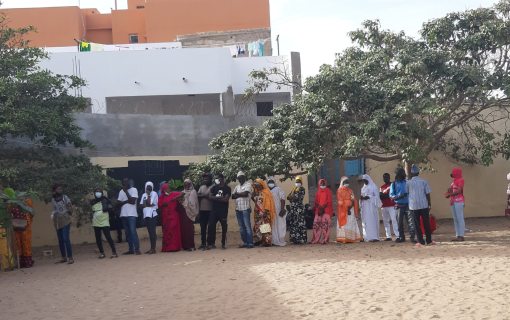Election Commission of Pakistan Launches its Second Five-Year Strategic Plan (2014-2018)
Outlining 162 objectives grouped under 13 broader goals, the Election Commission of Pakistan (ECP) unveiled its Second Five-Year Strategic Plan (2014-2018) during a press conference in Islamabad on June 5, 2014. The new plan comes a year after the successful 2013 General Elections, which marked the first time in Pakistan’s history that one democratically elected government completed its full term and handed power over to another democratically elected government.
There was a strong desire within the ECP for a second strategic plan, which demonstrates how the first plan influenced their strategic thinking. From the beginning, the organization took ownership over the process. This is a stark contrast to the reception of the first strategic plan, which many thought would be forgotten in a matter of months. However, ECP senior leadership sent a strong message across the organization, creating interest and ownership at all levels. Ultimately, the ECP accomplished 80 percent of the targets in the first plan by 2013. IFES has worked closely with the ECP, lending technical assistance to achieve the goals outlined in the first plan, and during the development of the second strategic plan.
The ECP leadership views the new strategic plan as a tool to organize its reform agenda leading up to the next general elections in 2018, and to involve ECP officials across the country in strengthening Pakistan’s democracy. Building on the reforms introduced in the previous five years, the ECP has set 162 objectives, grouped under 13 goals. The ECP’s second strategic vision is more forward looking. In its mission statement, the ECP highlights its intent to introduce new election technologies and create a more inclusive electoral and professional environment. Effective participation of women, youth, persons with disabilities and minorities feature prominently in the plan. The ECP recognizes that an inclusive electoral process ensures that all citizens are able to exercise their right to vote, thus increasing the credibility of the electoral process.
The strategic plan sets an agenda for electoral reform that covers key issues that observers, political parties and other electoral stakeholders highlighted in the 2013 General Elections. The overall reform agenda includes improving the legal and procedural framework; investment in the ECP’s human capital and structure; ensuring inclusiveness in the ECP’s functions and organizational structure; and exploring election technologies and using information technology as a strategic resource.
Responsibility for achieving the strategic plan targets do not just fall with the ECP at the central level; all department heads at the ECP secretariat and provincial election commissioners will be accountable for achieving various parts of the plan. IFES will work with the ECP on operational planning, implementation and monitoring over the next five years. The ECP’s Strategic Plan Implementation Committee and Review, Assistance and Facilitation Team will support the departments and generate regular progress reports.
Support for this project has been provided by the Canadian International Development Agency, the European Union and the UK government through UK aid . The contents of this website are the sole responsibility of IFES and do not reflect the views of the donors.









